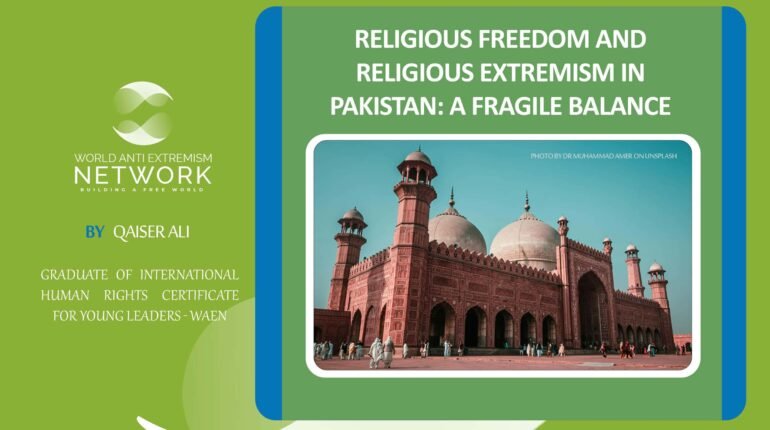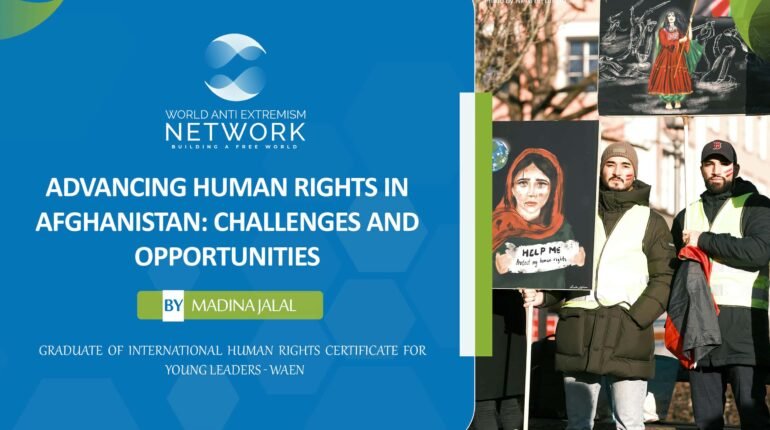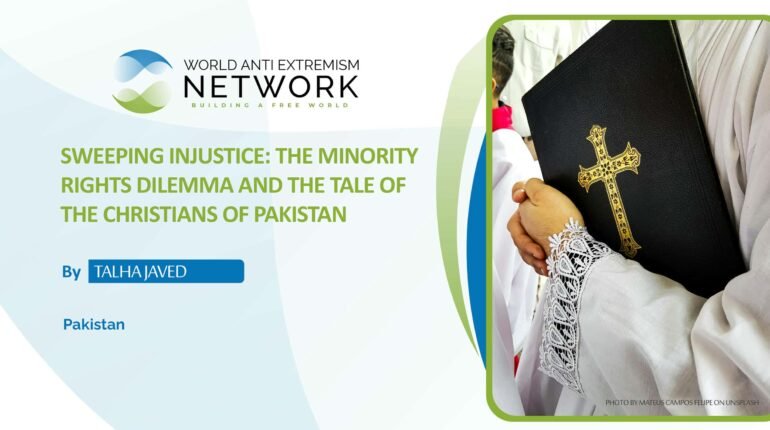Taliban’s Decrees Affecting Human Rights in Afghanistan
- World Anti Extremism Network
- Taliban’s Decrees Affecting Human Rights in Afghanistan

Human rights, especially those of women and marginalized groups, have rapidly and severely deteriorated in Afghanistan after the Taliban takeover in August 2021. The regime’s implementation of severe, restrictive decrees has systematically violated the rights and freedoms many Afghans had come to enjoy during the two decades before the takeover. Such decrees are not only discriminatory, but they also cause lasting consequences on the social, economic, and political nature of Afghan society.
When peace talks were underway, the Taliban tried to look more moderate, promising respect for human rights and the rights of women and girls. Yet, these were promises of this kind, which turned out to be superficial with time and which realized them as a need for tactical play to gain power. According to United Nations (UN) human rights experts, the Taliban has waged a campaign of systematic discrimination and subjugation, particularly against women, girls, as well as ethnic and religious minorities. This type of systematic repression is classified, in other words, as gender persecution and, under some circumstances, as gender apartheid. This reality of Taliban rule is very evident in many decrees issued that prohibit participation in education, employment or even public life and exclude women from Afghan society.
One of the most obvious evidences of the oppressive rules adopted by the Taliban is their insistence on strict dress codes for women. A new decree has ordered that women must cover their faces in public and must wear the strict hijab – the burqa – which the Taliban allows. Non-compliance leads to punishment for the female guardian.
In addition, they have also imposed restrictions on men as well. The Taliban have ordered barbers not to shave men’s beards and also ordered male teachers in Kandahar to sign a written commitment assuring their support to the Islamist group’s interpretation of sharia law. As a result, the reigning terror environment encompasses all people, as men and women are threatened with dire consequences for not adhering to the Taliban orders, such as allowing themselves to participate in civil and political gatherings.
Denial of Education and Employment
The most outstanding of such edicts was the one that barred girls from attending secondary schools, which affected about three million girls all over Afghanistan. This, coupled with other prohibitions on women working in several areas, like NGOs and the UN, had devastating consequences such as restricting their opportunities for education and economic independence. The Taliban’s Ministry for the Promotion of Virtue and the Prevention of Vice has enforced strict dress codes and gender segregation, further entrenching gender-based discrimination. Reports indicate that women are now prohibited from working in most sectors. According to Amnesty International (2023), even those who had been employed previously face increasing restrictions on their movements and employment opportunities.
Depriving Afghan women of educational and work opportunities is a serious violation of their basic human rights. Access to education and the ability to work is important not only for the empowerment of individuals but also for the general development of society. By suppressing the potential for economic growth, innovation and development of the country, they have deprived half of the population of the right to learn and earn. These destructive actions destroy all aspects and even affect the future of the youth more.
Restricting Personal Freedoms
Apart from education and employment, the scopes of the Taliban’s decrees are broader, affecting personal freedoms and societal participation. Women are banned from participating in public facilities such as parks and gyms, and are usually violently punished for not adhering to the regime’s interpretation of Islamic law. The regime has also reinstated measures reminiscent of its previous rule, including public floggings and executions for moral crimes.
These acts are not only against human rights and international conventions, but they also instill a strong environment of fear and intimidation to the population. On the other hand, civil and political activities were completely banned in the country and as a result another blow was inflicted on public freedoms. The strong step applied by the Taliban made an environment where civil liberties have always been under scrutiny. Freedoms of expression, assembly, and association are denied, and people face reprisals for daring to express opposition to the regime. This backslide into authoritarianism, therefore, undoes all the gains that have been registered in Afghanistan over the last two decades and pushes the country right back to an authoritarian state where fundamental human rights are denied.
Devastating Impacts on Society
The result of such decree for the Afghan society is enormous. The systematic marginalization of women from public life denies them their rights and has severe economic impacts. UNICEF calculated that if girls were not to be educated, then Afghanistan’s GDP would be decreased by about 2.5% each year concerning potential contributions to the labor force because of women’s education. What is more, the erosion of civil liberties has created a chilling effect on freedom of expression: many journalists and activists have been harassed, arbitrarily detained, and even enforcedly disappeared for speaking out against the Taliban.
Therefore, the form of governance of the Taliban demonstrates a common tendency towards authoritarianism which seeks not only to manage the political region but also to penetrate into the social and cultural life of the country. Through the imposition of draconian decrees that impinge on basic human rights, the regime tries to return to a “pure” Islamic system—with no pluralism and freedoms that characterized Afghanistan since the fall of the Taliban in 2001. This regression thus does not only compromise the rights of individuals within Afghanistan but also stands in sharp contrast to global human rights norms.
Global Response is Much-Needed
The international response to the Taliban’s human rights violations has been miserable. Although there has been accountability raising and investigations on gender persecution as a crime against humanity, the international community has raised disconnected voices with no sustained pledge. Afghanistan, in particular, has lost focus as it is overshadowed by many other important international activities of concern. This inattention and inaction have resulted in disturbing apathy to the plight of Afghan women and other oppressed groups.
Further, a concerted and sustained response at the international level is needed for the current human rights violations in Afghanistan. The shared efforts of the world must include diplomatic commitment, supporting humanitarian assistance, and investing in civil society actors who are struggling for women’s rights and general human rights. Further, the international community must seek ways to hold the Taliban to account for its abuses through mechanisms that include sanctions, international tribunals, and crimes against humanity investigations.
The Taliban’s orders are followed by immense, serious, and regular human rights abuses in Afghanistan, most of which are targeted at women, religious and ethnic minorities. The international community should realize and concentrate on the gravity of the matter and take action to help civil society in Afghanistan while holding the Taliban accountable for all the alleged brutalities committed. They must pay attention to the situation of people, paving the way for the civic and socio-political activists. The struggle for human rights in Afghanistan is not only a local issue but also an inevitable global imperative, a reflection of our common commitment to the dignity, justice, and freedom of an entire nation. The international community should not allow them to be recognized and normalized. Any relation and engagement with the Taliban will only encourage and normalize them. The world cannot sit by as decades of progress in human rights development are now allowed to be rolled back by the Taliban, leaving future generations of Afghans to cope with the consequences.

About the Author
Paiman Riazat holds a bachelor's degree in Law and Political Science. He is currently a Global Ambassador for the World Anti-Extremist Network (WAEN), specializing in human rights, war crimes, crimes against humanity, justice, and peace. With extensive experience, Paiman has focused on researching legal issues, defending human rights, promoting justice, and empowering other people to safeguard human rights. He has served as a Volunteer Reporter for the International Organization for Transitional Justice and Peace (ITJP), assisted as a defense lawyer, and interned in legal research at the International Institute of SDGs and Public Policy. Through his academics and professional careers, he is committed to bringing awareness of globalization and gender equality, fostering peace and diversity, and countering extremism through impactful research, seminars, workshops, mentoring, and developing a better future for all.
The opinions expressed in these articles are solely those of the authors and do not reflect the views or positions of the organization. If you find any information incorrect, please contact (research@worldantiextremism.org), and we would be happy to assist you. You can download, distribute, and reuse this work, provided you credit the author and cite the original source.
Related Articles
Subscribe to our newsletter and stay updated.
Contact
Toronto, Ontario, M1L 0E5 Canada
Subscribe to our newsletter and stay updated.
Contact
Toronto, Ontario, M1L 0E5 Canada
Subscribe to our newsletter and stay updated.
Contact
Toronto, Ontario, M1L 0E5 Canada






